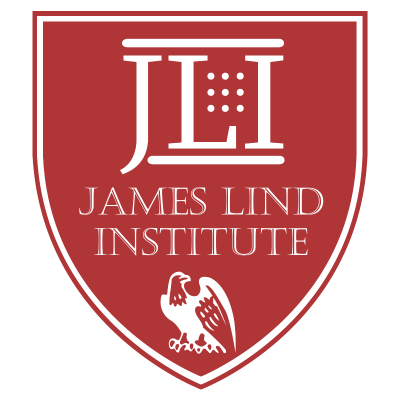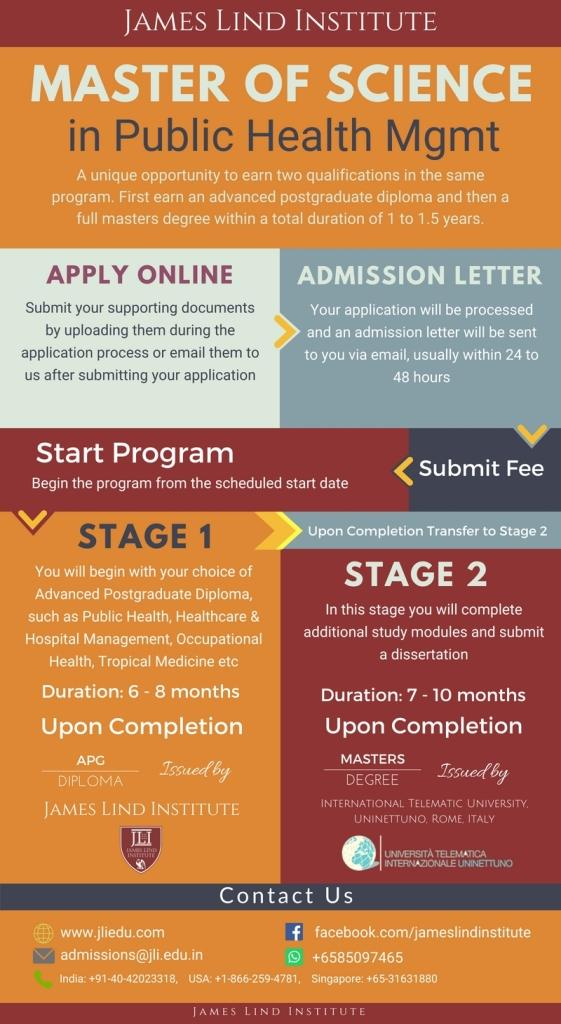
A Masters in Public Health degree (MPH) opens up the gateway towards a rewarding career in the crucial and enduring field of Public Health.
Master’s in Public Health Management (MPH) course is an online taught program conducted by James Lind Institute (JLI) in collaboration with the International Telematic University UNINETTUNO, Rome, Italy.
The JLI online MPH program proceeds in two stages. In the first stage you earn an advanced postgraduate diploma in any of the health specialities like public health research, maternal and child health, tropical medicine, global health, occupational health, environmental health, healthcare management or clinical research. The second year is the master’s level in public health and includes a dissertation. Details about the online MPH program are available here

The classical definition of public health as stated by the World Health Organization (WHO) is “the art and science of preventing disease, prolonging life and promoting health through the organized efforts of society” (Acheson, 1988; WHO). In the modern scenario Public Health is an intensive and interdisciplinary application of a wide range of evidence-based, scientific, technological, and management systems implementing strategies to improve the health and economics of individuals and populations. Contemporary Public Health is an ongoing target with inbuilt continuous improvements based on scientific advances, informatics revolution and data analytics.
Public health is taught at James Lind Institute with an international overview, focusing on the various career pathways in which public health professionals have become indispensable worldwide. Public health professionals often work at national and international levels, as public health leaders and researchers and are key players in developing epidemiological strategies and methods to prevent disease, develop social reforms, and promote health and well-being.
Capacity building and service quality are key management principles in public health which aim to provide conditions to develop and maintain health and wellbeing, or prevent development or deterioration of disease or infirmity.
Public health provides an impetus on the entire spectrum of health and wellbeing, not only the eradication of particular diseases or condition. Many public health activities are targeted towards populations such as health campaigns. Public health services also include the provision of targeted and specialized services like vaccinations, epidemic control, disaster management, environmental awareness, behavioural counselling, health advice or social upliftment. Public health policy making and financial management also requires specialized skills.
If you have the aptitude to make a significant difference in the world around you, studying a Masters in Public Health degree (MPH) could be extremely rewarding. If you hold a commitment to improve the health of people around you, you will discover that studying public health can lead to a range of fulfilling and far-reaching public health careers.
Global health issues such as HIV/AIDS, avian bird flu, SARS, malnutrition, global warming and the recent Ebola virus have significantly increased awareness and understanding of the critical importance of public health in today’s global society.
Emerging Issues in Public Health in Nigeria
Globally, the mortality and morbidity from non-communicable diseases like heart disease, stroke, diabetes and injuries, is increasing. At the same time in most of the regions of the world, the number of deaths from infectious diseases, such as malaria, tuberculosis, and vaccine-preventable diseases, is decreasing. It is slowly coming to light that developing nations must now deal with a “dual burden” of disease: they need to continue measures to prevent and control infectious diseases, while also address the adverse health impact from non-communicable diseases and environmental health risks. Persistent improvement in social and economic conditions in developing countries brings in a need to focus surveillance and control measures towards noncommunicable diseases, mental health, substance abuse disorders, and, especially, injuries (both intentional and unintentional). Some developing countries are beginning to establish programs to address these issues.
Globally, human development in the various aspects of life has given birth to several consequences that has given birth to nutritional, demographic and epidemiological shifts and non-communicable disorders (NCDs) which has far reaching impact on population health.
Nigeria is following the worldwide trend as NCDs account for 24% of total deaths, where cardiovascular diseases lead at 7% of deaths attributable to NCDs, while cancers, diabetes and chronic respiratory diseases account for 3%, 2% and 1% of proportional mortality. The World Health Organization (WHO) reported that the probability of dying prematurely from NCDs in Nigeria was reported at 20%. The same report also showed that population cardiovascular risk factors were highest (34.8%), followed by alcohol consumption and smoking with the least being obesity (6.5%), with a generalized male preponderance (Olukoya O. THE WAR AGAINST NON-COMMUNICABLE DISEASE: HOW READY IS NIGERIA? Annals of Ibadan Postgraduate Medicine. 2017;15(1):5-6.).
Major sectors you can work in with an MPH from James Lind Institute
Students who graduate with an MPH from James Lind Institute can have the opportunity to work for various employers in the public, non-profit, education, and private sectors.
Public: MPH postgraduates who explore employment within the public health sector work for local, state, national, or international governments or allied agencies. Those who work in public sector roles in public health have the opportunity to be at the forefront of the overall health of individuals, communities, populations and at national and international level. Positions in these roles may include public health physicians, public health pharmacists, public health nurses, public health laboratory professionals, public administrators, epidemiology program leaders, clinical researchers, public health statisticians, public health policy makers, etc.
Non-profit: This not for profit sector typically involves organizations or agencies that focus on a certain population or one particular health disparity, such as diabetes or childhood obesity. One example of a public health job in the non-profit sector for graduates with an MPH are individuals who provide disaster relief prevention for agencies like The International Red Cross, Médecins Sans Frontières/Doctors Without Borders (MSF), Mennonite Central Committee, The Ananda Marga Universal Relief Team, The Nazarene Disaster Response, REACT International, CityTeam International Disaster Response, OXFAM, Billy Graham Rapid Response Team, ADRA Canada, Hope Worldwide, NECHAMA, Plan India, Save The Children, United Methodist Committee on Relief, CARE, AmeriCares, GlobalGiving, International Relief Teams, Bill & Melinda Gates Foundation, ICCO, Relief International, Engineers Without Borders, GlobalMedic, ShelterBox, reliefweb, etc. Individuals working with these organizations will oftentimes travel to other countries and experience different cultures.
Education: MPH program graduates can take up employment in the education sector. There are opportunities in research and data analytics and as teachers, trainers, mentors, lecturers and professors. The job titles may also include public health educator and director of student health services.
Private: Employment in the private sector in public health is popular among those who want to work on a contract or consulting basis, or for private public health organizations. These fields include occupational health, environmental health, insurance, and pharmaceutical manufacturing and marketing.
If you find yourself interested in learning skills to contribute to the evergreen field of public health with immense career rewards, a Master’s in Public Health (MPH) is the right program to go for. Online MPH program at JLI is a highly focussed program to develop public health professionals who are compatible and skilful to work at any level of the public health enterprise, be it the community, national or international level.
MPH TOTAL CREDITS EARNED:
ADVANCED PG DIPLOMA LEVEL (Stage 1): 32
MASTER LEVEL (Stage 2): 90 (Including credits transferred from Stage 1)
MPH mode of Study: Online
_________________________________________________________________________________
James Lind Institute (JLI) also offers a Master of Science in Health Management.
This Master of Science in Health Management is also conducted by James Lind Institute in collaboration with the International Telematic University UNINETTUNO, Rome, Italy. This program also allows you to earn an Advanced Postgraduate Diploma from JLI first and then upgrade it to a Master of Science degree from the International Telematic University.
Other JLI programs
- Advanced PG Diploma in Global Health Management & Policy
- Advanced PG Diploma in Global Sexual & Reproductive Health Management
- Advanced PG Diploma in Public Health Research
- Advanced PG Diploma in Healthcare & Hospital Management
- Professional Diploma in Medical Tourism & Healthcare Marketing
- Advanced Certificate in Medical Law & Bioethics
- Certificate in Healthcare Risk Management
- Advanced PG Diploma in Global Maternal and Child Health
- Professional Diploma in Public Health Management
- Advanced PG Diploma in Tropical Medicine, Surveillance and Immunization
What’s the full tuition for the masters in public health program? I am interested in the program.
Please what is the tuition fee and course duration